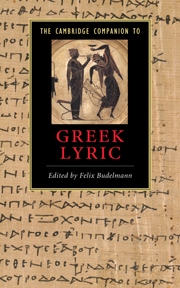Book contents
- Frontmatter
- Introducing Greek lyric
- Part I: Contexts and topics
- 1 Genre, occasion and performance
- 2 Greek lyric and the politics and sociologies of archaic and classical Greek communities
- 3 Greek lyric and gender
- 4 Greek lyric and the place of humans in the world
- 5 Greek lyric and early Greek literary history
- 6 Language and pragmatics
- 7 Metre and music
- Part II: Poets and traditions
- Part III: Reception
- Chronology of select melic, elegiac and iambic poets
- Further Reading
- Glossary
- List of works cited
- Index
4 - Greek lyric and the place of humans in the world
from Part I: - Contexts and topics
Published online by Cambridge University Press: 28 May 2010
- Frontmatter
- Introducing Greek lyric
- Part I: Contexts and topics
- 1 Genre, occasion and performance
- 2 Greek lyric and the politics and sociologies of archaic and classical Greek communities
- 3 Greek lyric and gender
- 4 Greek lyric and the place of humans in the world
- 5 Greek lyric and early Greek literary history
- 6 Language and pragmatics
- 7 Metre and music
- Part II: Poets and traditions
- Part III: Reception
- Chronology of select melic, elegiac and iambic poets
- Further Reading
- Glossary
- List of works cited
- Index
Summary
Introduction: Human wisdom and poetic expertise
Greek lyric poetry was, among other things, a form of communication about the world that its authors and audiences lived in. It was also often an intervention into that world, with intended effects or functions. That is to say, not only does Greek elegiac, iambic, choral and monodic poetry offer explanations, speculations and justifications - or sometimes complaints - about the nature of human existence in general, and about particular local and personal circumstances, but the very production and performance of these poems also frequently seeks more or less directly to bring about change in those circumstances, or at least to provide some kind of comfort for the impossibility of doing so. Thus, much more obviously than e.g. in the case of epic, and more like 'didactic' poetry, Greek lyric tends to be involved in bringing about the very state of affairs that it is describing or prescribing: it is 'perlocutionary'. Consequently almost all these poems, whatever their purpose and occasion, assert or imply some identifiable attitudes and opinions about the world and the best way to live in it. In this chapter, I shall be discussing some of the most typical and/or striking of these attitudes and opinions, as well as some of the characteristic techniques and terminologies employed to convey them to their audience.
During the archaic period it was widely believed (or the fiction was maintained) that the talent required to engage and delight audiences was derived more or less directly from a divine source. And while such expressions as 'gift from the gods' were commonly applied to all kinds of fortunate human attributes (beauty, strength, prosperity, etc.), poetic skill and intelligence in general do seem to have been regarded as especially blessed endowments. Thus the standard epic epithets for song and poet, ‘divine, heavenly’ (thespesios, thespis, theios), are employed in lyric too, and the dynamics of poetic inspiration and empowerment are described in numerous half-literal, half-figurative images.
- Type
- Chapter
- Information
- The Cambridge Companion to Greek Lyric , pp. 72 - 94Publisher: Cambridge University PressPrint publication year: 2009
- 1
- Cited by

